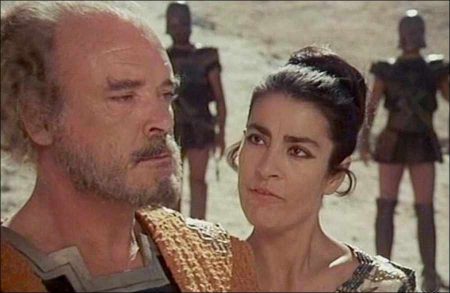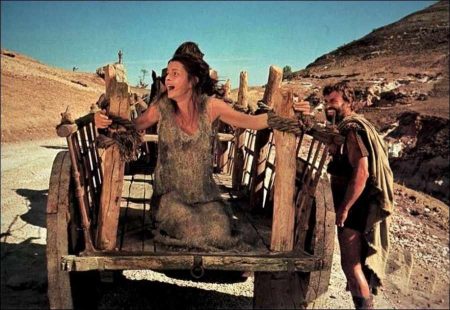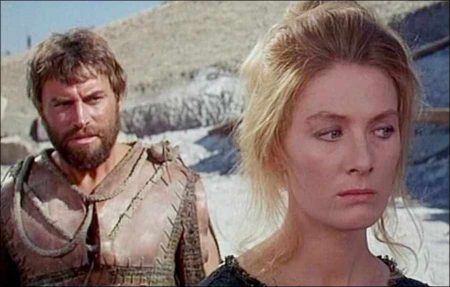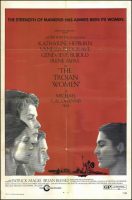Taglines: The strength of mankind has always been its women.
The Trojan Women movie storyline. In the aftermath of the Trojan War, Queen Hecuba, the mother of slain Prince Hector, and the surviving women of Troy face a fate worse than death: they are to be taken back to Greece as slaves. With their men slaughtered and the city in ruins, the Trojan women refuse to surrender, knowing that the fall of their beloved city marks the beginning of a disgraced life of slavery.
And, against the backdrop of the ravaged city of Troy, a few women try to avert the inevitable: Cassandra, priestess of Apollo and Hecuba’s insane daughter; beautiful Helen of Argos, King Menelaus’ adulterous wife and the woman responsible for all the suffering, and Andromache, Hector’s widow and desperate mother of his only son Astyanax–the boy who must die.
The Trojan Women (Greek: Τρωάδες) is a 1971 American-British-Greek war drama film directed by Michael Cacoyannis and starring Katharine Hepburn, Vanessa Redgrave, Geneviève Bujold and Irene Papas. The film was made with the minimum of changes to Edith Hamilton’s translation of Euripides’ original play, save for the omission of deities, as Cacoyannis said they were “hard to film and make realistic”.
About the Production
When filming began in the Spanish village of Atienza, 80 miles northeast of Madrid, sections of the press were speculating that there might be fireworks between the lead actresses. Hepburn had recently gone on record deploring the moral squalor and carelessness of the modern generation, and the impulsive and radical Redgrave was thought by some of the press to be a symbol of that “sloppy” generation. In fact, the actresses got on well, talking about painting, politics, and acting —Hepburn expressed enthusiasm for Redgrave’s 1966 Rosalind in As You Like It— and both actresses began to learn Spanish.
Cacoyannis first staged The Trojan Women in Italy in 1963, with Rod Steiger, Claire Bloom, and Mildred Dunnock in the leading roles. Later in the same year, he took the production to New York, and in 1965, to Paris. “For me”, he said in a 1971 magazine interview, “the play is particularly pertinent and real. What the play is saying is as important today as it was when it was written. I feel very strongly about war, militarism, killing people … and I haven’t found a better writer who makes that point more clearly than Euripides. The play is about the folly of war, the folly of people killing others and forgetting that they are going to die themselves.”
Katharine Hepburn’s costume was designed by Nicholas Georgiadis of Covent Garden. Cacoyannis hand-picked Italy’s Franco Freda and Adalgisa Favella as make-up artist and hair stylist, respectively, for the film. Both were veterans of the films of Federico Fellini, Michelangelo Antonioni, and Luchino Visconti.
Hepburn said of her acting for this part: “My acting has always been a little flamboyant and rococo. But for this part, I’ve had to pare right down to the bare essentials.” Her acting voice dropped, after special training, by an octave, and was almost accentless; the familiar twanging pitch and East Coast rhythms almost vanished.
The Trojan Women (1971)
Directed by: Michael Cacoyannis
Starring: Katharine Hepburn, Vanessa Redgrave, Geneviève Bujold, Irene Papas, Brian Blessed, Patrick Magee, Pauline Letts, Rosalind Shanks, Anna Bentinck, Pat Beckett, Esmeralda Adam, Elsie Pittas
Screenplay by: Michael Cacoyannis
Production Design by: Nicholas Georgiadis
Cinematography by: Alfio Contini
Film Editing by: Michael Cacoyannis
Costume Design by: Nicholas Georgiadis, Annalisa Nasalli-Rocca
Art Direction by: Román Calatayud, Alistair Livingstone
Makeup Department: Adalgisa Favella, Franco Freda
Music by: Mikis Theodorakis
MPAA Rating: None.
Distributed by: Cinerama Releasing Corporation
Release Date: September 27, 1971
Views: 22



